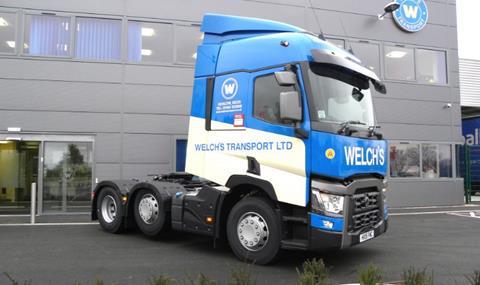
Cambridgeshire haulier Welch's Transport has admitted its figures for April will be “a disaster” as it struggles with only 60-70% of normal volumes.
However, MD Jim Welch told motortransport.co.uk that some of his customers have begun to reopen their businesses and are expecting the government to ease the current lockdown after the first May bank holiday.
“Customers are starting to position themselves accordingly,” he said. “They might be premature expecting things the following week but certainly that’s what some of our customers are getting ready for.
"One or two who had closed have found ways to open again, albeit at a reduced volume, and some of the others who remained open are adapting their working practices so that social distancing rules are met.
"I’ve pulled a few people back off furlough this week and re-taxed a few vehicles."
Welch claimed pressure from the business community may end up forcing the government’s hand: “You can see this week there’s far more traffic on the road, so the country is starting to unlock itself," he said. "We sit on the top of the M11 and A14 at Cambridge and that’s a bit of a thoroughfare for the south coast ports and Felixstowe and Harwich. We’re starting to see vehicles flying around.
“A lot of sectors made the lockdown decision themselves. The government lockdown followed on behind and we might see a bit of that in terms of unlocking it. Sectors are going to vote with their feet and the government are going to have to rubber stamp it.”
Welch's Transport has a wide portfolio of customers but Welch said its bias towards the badly hit construction sector meant 40% of his fleet was parked up and 30% of his workforce had been furloughed.
“Relatively speaking, April will be a catastrophe,” he said. “Because although you’ve stopped vehicles and saved road tax and insurance and you've furloughed a load of staff, you’re effectively keeping the infrastructure going for 60-70% of the volume.
“There’s a powerful argument that we’d be better off financially if we’d just shut the lot up and furloughed all the staff. Because that way you get rid of more costs than continuing to trade. Our model doesn’t work if you lose 30-40% of volume overnight. You can’t adjust it in days or weeks. When you take a big part of the full- and part-load freight away it’s difficult to make the model work.
“We’ve got contractual commitments to customers and to the networks so shutting was never an option. But financially it’s going to be a disaster. You can’t lose your fixed costs. You’ve still got the depots, you’re still paying all the rates and insurance. So by definition you’ve got to take a massive hit financially.”
A member of Palletline, Hazchem and the RHA, Welch confirmed that the extent to which other firms had been affected by the pandemic depended on the sectors they serve.
“We’ve got a very diverse customer base,” he said, “and we see the extremes of people who’ve closed to people ticking along, people doing normal business and people who are very busy.”
He agreed that events haulage had been particularly badly hit. “The reality is that until they get a vaccine they’re not going to let lots of people get together anymore,” he said. “There are certain sectors that aren’t going to get unlocked at all but they do need to crack on and unlock as many as they can.
“But the networks aren’t doing too bad. Looking at Palletline and Hazchem volumes, they’re probably holding up better than when we were talking about it four weeks ago.
“Whether we make redundancies will depend on the sort of economy we’ve got as we emerge from this. There’s no need to at the moment.”
The company has also benefited from the government’s furlough scheme, he said, and from the cheap price of fuel.
However, like most of the haulage sector, Welch has resisted the government’s new loan schemes.
“They’re not really a help,” he said. “We’re fortunate that we have good financial strength and I’ve got money to lose, but that doesn’t make it more palatable. I’m not convinced that borrowing money from the government to keep the transport business going is a very good idea because as soon as normality comes back you’ve got more loans to pay off. That can’t be a commercially sensible thing to do. I can’t think of anyone who’s borrowed any money.
“The businesses that couldn’t borrow before probably still can’t and those that didn’t need to before probably still don’t.”













